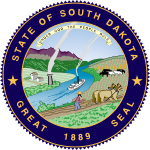| ||||||||||||||||||||||
Marijuana Legalization Initiative | ||||||||||||||||||||||
| Results | ||||||||||||||||||||||
|---|---|---|---|---|---|---|---|---|---|---|---|---|---|---|---|---|---|---|---|---|---|---|
| ||||||||||||||||||||||
| Source: South Dakota Secretary of State | ||||||||||||||||||||||
| Elections in South Dakota |
|---|
 |
South Dakota Initiated Measure 27 was a 2022 voter initiative to legalize non-medical cannabis in the U.S. state of South Dakota. The initiative was certified by the South Dakota Secretary of State for the 2022 ballot on May 25, 2022. [1] [2] South Dakotans for Better Marijuana Laws (SDBML) organized the petition drive, and it was opposed by Protecting South Dakota Kids. [3]
Contents
The initiative received a 52.92% no vote in the November 2022 election, and did not become law. [2] [3]